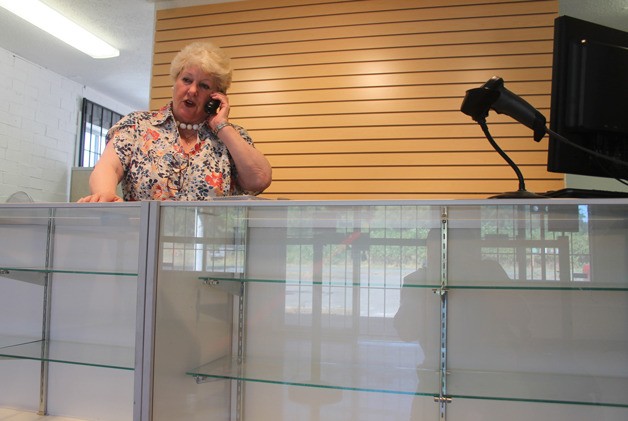Editor’s note: An earlier version incorrectly stated the per gram price of Island Alternative Medicine’s marijuana.
A South Whidbey entrepreneur became the first person with a license to sell recreational marijuana in Washington this week.
The process was arduous and the startup costly, but Maureen Cooke, owner of Mo’s Pub and Eatery in Langley, was the first name on the state’s list of approved sellers released Monday, July 7. Yet for all the hurdles jumped, money spent and time invested into Cooke’s newest venture, Whidbey Island Cannabis Company, she’ll have to bide her time a bit longer as the wait for something to sell continues and delayed a grand opening planned for Tuesday. Her store is ready. She just needs the pot.
“I’m gonna feel better once I have some product in here,” Cooke said. “…It’s all money out with nothing coming in.”
Cooke said she hopes to have buds, oils and tincture for sale by Friday. There will not be edibles, such as pot brownies or weed cookies, because the state is not allowing them yet. Prices were not known as of press time.
Washington voters approved Initiative 502, which legalized recreational marijuana consumption and possession up to one ounce, in November 2012. It has taken the Washington State Liquor Control Board nearly 18 months to set out the rules and process applications for the production, distribution and sale — three distinct parts of the business. Cooke’s store represents the third step: retail.
Her shop is about 875 square feet in a small strip of storefronts in Bayview on Kramer Road. On Monday, she first learned she had received one of Island County’s four allotted retail licenses. But the short notice for licensed growers a few weeks ago did not allow much time for them to harvest enough marijuana — product, as Cooke refers to it — for all 24 stores that were licensed in the first wave of issuances.
“We all know you don’t grow marijuana in three weeks,” Cooke said.
Inside, the short rectangular space for customers seems more like a pharmacy than some kind of smoke den or even a liquor store. Several stanchions will direct customers to one of two digital cash registers. Because federally-insured banks are leery to open accounts with marijuana businesses, still a banned substance according to the U.S. government, Cooke’s store can only operate with cash.
Cameras are in each corner inside and outside. All told, 15 cameras record every movement, day and night, as a security measure. The more obvious protection includes gated windows and doors. Behind the glass counter that fully separates customers from employees are three safes, and in a back room is a fourth safe, of which Cooke was mighty proud.
Waiting on the impact
For all the nationwide interest in Washington’s pot legalization, on South Whidbey people remained mostly mum and curious. The only next door neighbor is restaurant El Corral, whose family owners were ambivalent about its presence. The Bayview area’s leader, Goosefoot Community Fund, was mostly interested in having an additional business and seeing how it would pan out.
“We welcome new businesses … I don’t see it as a big problem,” said Sandy Whiting, executive director of the nonprofit that owns the Bayview Cash Store and Goose Community Grocer at Bayview Center.
Later, Whiting reflected on the cannabis store’s spot, a bit away from the grocery store and busy areas.
“I think the location, for what she’s doing, is fine,” Whiting said of Cooke. “She doesn’t need to be on front and center traffic. People will certainly find her.”
The rest of the county waits
Island County had four allotments, with only one designated for a specific location in Oak Harbor city limits. The liquor control board received four applications from Island County: one on Camano Island, one in Oak Harbor, one in Freeland and one from Cooke. In theory, should the other three pass state regulators’ muster, they will also be able to set up shop.
Lucas Jushinski, owner of a non-profit medical marijuana dispensary in Freeland, also applied to run a recreational marijuana store. Citing all of the issues Cooke has faced, particularly in procuring product, he decided to wait and see what comes of the first six months or year of operation.
“I think there’s gonna be a lot of problems in the first wave,” Jushinski said. 
Selling marijuana at too high of a cost didn’t make sense to Jushinski, who has run his medical cannabis store for two years and offers it between $10 and $15 per gram. Some stores that were able to have product on-hand this week were selling weed for up to $27 per gram. With taxes, it pushed past $30 per gram, almost three times as much as its street value, he said. If the state and stores can’t find a way to bring the cost down, they may not convert illegal marijuana sales into tax revenue.
“I think there’s already a lot of cannabis on the island from the black market, so I don’t think there’s a big need for people to buy it when they can get it from their neighbor,” Jushinski said, adding that high sales costs could keep him from ever opening a retail marijuana store.
Island County Economic Development Council Director Ron Nelson anticipated marijuana sales drumming up more money for the state and county.
“From an economic standpoint, it’s going to generate a lot of tax revenue, for the state especially, which could help the General Fund,” Nelson said. “It has the potential, as we’ve seen in Colorado, in increasing the number of visitors … Recreational marijuana tourism, that could lead to increased tourism in the Langley area and increased economic activity.”
“It will be fascinating to track what kind of an impact it does have,” he added.


